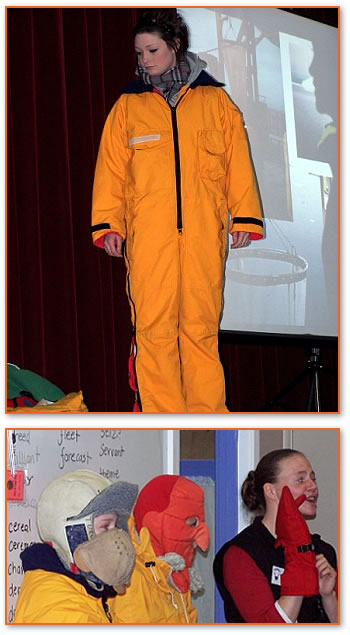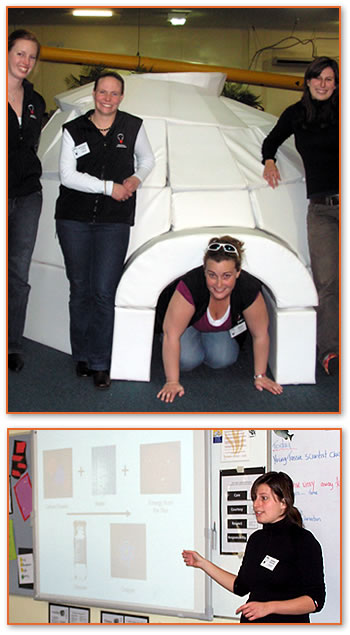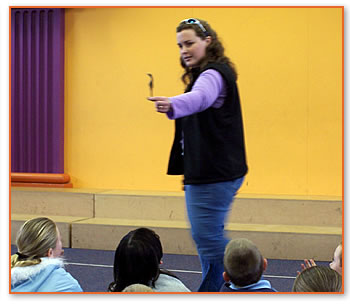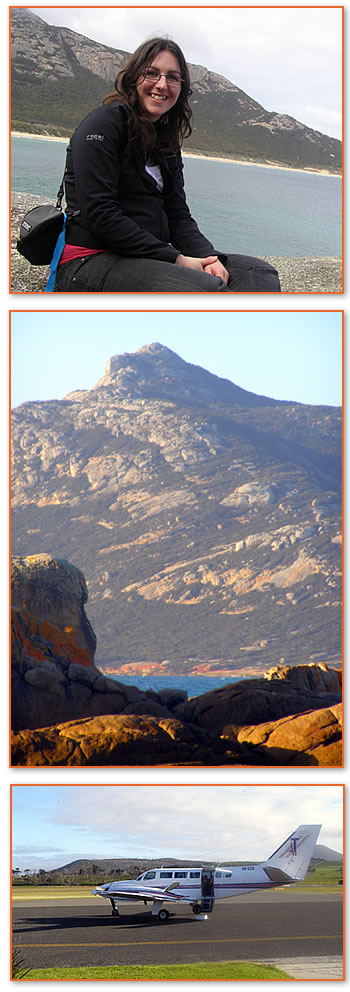
The Young Tassie Scientists do some amazing work –
and they will be going around Tasmania to tell everyone,
especially school students, about it!
From King Island in the north to Geeveston in the south, the YTS will be travelling hundreds of kilometers on four separate roadshows around the state. They’ll be visiting over 30 schools to give presentations about what they do and why they do it.

Roadshow One: Southern Tasmania
We kicked off ‘The Young Tassie Scientist’ roadshows with a bang!
The first roadshow began with a visit to Cambridge Primary where Year 4, 5 and 6 classes learnt all about the Southern Ocean food web, seahorses, octopus, sharks, turtles and volunteering opportunities in science. Not only did the students learn something but so did the scientists!
It was then off to Herdsman Cove Primary where we spoke to the Year 5 and 6 students about the different options you have if you study science and what we have done so far. They were very curious about what creatures we have worked on and what different areas of science there were –such as zoology and botany.
Cygnet Primary put on a real show with Year 4, 5 and 6 classes showing us just how much science they knew. They loved learning about what Virginia and Margaret did in the Antarctic and how the food web works in the Southern Ocean, and Jimmy amazed them with his pictures of sharks and whales.
Then it was time to move onto some high schools, so to Huonville and Geeveston we went, talking to roughly 100 students in Years 7-10 about what we do and career options in science. It is amazing how many budding young scientists we have out there! At Geeveston, students were particularly fascinated with seeing what it would be like to work in Antarctica.
When:
6 - 8 August
Where:
Cambridge, Cygnet, Geeveston, Margate, Huonville, Hobart
Who’s Going:
Renee Florent (fish health)
Jimmy White (octopus aging)
Margaret Lindsay (zooplankton)
Virginia Andrews-Goff (weddel seals)
Roadshow Two: The North West and King Island

This road show began with a visit to New Norfolk Primary where Year 3, 4 and 5 students learnt all about the Southern Ocean food web, civil engineering, and how cool it is to be a botanist, thanks to Margaret, Jess and Bonnie.
We then headed north to Punchbowl Primary where we spoke to students about the different options you have if you study science and what we have done so far. Students discovered what can affect waterflow in hydro canals; and they also learnt a few experiments that they could do at home showing the difference between freshwater and seawater.
On the Northwest Coast, we visited Nixon Street Primary and Penguin Primary. Margaret talked about her work in Antarctica and demonstrated how the food web works in the Southern Ocean. Students had a great time being botanical detectives and identifying unknown eucalypts with Bonnie.
At the Imaginarium Science Centre evening session, we spoke to some very enthusiastic children and their parents about our work, and got everyone involved in putting together a Southern Ocean food web. A great night was had by all! Even the scientists, exhausted after a long day, had a go at building the igloo, part of the Imaginarium’s polar science display.
The next day, we headed off to King Island. We talked to both the primary and secondary schools, and even got a mention in the King Island Courier! We had a well-deserved break in the afternoon and were able to sample (and purchase!) some of the very fine produce that King Island has to offer. Then back to Wynyard where our last stop was Table Cape Primary. They were the first school on this road show to identify that krill is the biggest fishing industry in the Southern Ocean, so well done!
When:
14 - 17 August
Where:
New Norfolk, Launceston, Devonport, Penguin, King Island, Wynyard
Who’s Going:
Renee Florent (fish health)
Jess Andrewartha (renewable energy)
Bonnie Galbraith (freshwater algae)
Margaret Lindsay (zooplankton)
Road ShowThree – The Midlands

We started with a trip to Oatlands District High where we spoke to Yr 9 and 10 students. This road show was a little different as we had two scientists from the human health sciences, Heather and Jerome - so far we have had marine scientists, a botanist and an engineer on the road shows.
From here, we went onto East Launceston Primary where we spoke to a group of Yr 4, 5 and 6 students who had some very interesting questions. Students doing health–related projects were able to pick Jerome’s brain to find out what drugs can do to the brain. They were also were curious about seahorses to and loved to be able to touch some dried seahorses and learn all about how it is the male that falls pregnant and has all the babies.
Onto Exeter where Heather and Jerome grossed the Yr 5 and 6 students out with the body bits that they brought along, showing the difference between healthy and smoker lungs, what a brain looks like and what skin cancers can look like.
Trevallyn Primary asked lots of questions and particularly enjoyed all the brain activities that Jerome did with them on the internet. I was very impressed by the amount of information they knew about seahorses and the fact that many of them had grown sea monkeys at home before.
This road show finished in Campbell Town where we spoke to the high school students and gave them an idea about how far germs can spread through the use of a pigmented moisturizer and a special light. They couldn’t believe how far three students had spread the “germs” through the class. And we weren’t going to let the teachers escape that easily - we tested their brain power and skills with a few brain teasers and games just to see how clever teachers really are.
When:
22 - 24 August
Where:
Oatlands, Launceston, Scottsdale, Campbell Town, Brighton
Who’s Going:
Renee Florent (fish health)
Heather McGee (cancer prevention)
Jerome Staal (brain injury)
Road Show Four – The North and Flinders Island

The lucky last road show began with visits to some Hobart schools with Lisa, Sarah and Janelle. Students learnt all about seahorses, migrating shore birds, tracking possums, and the quality of our beaches and waterways.
Then it was off to the other end of the state – to Mole Creek Primary where we spoke to the entire school. We had heaps of helpful volunteers with our demonstration to show how pollution gets into our waterways. Somewhat more scary was the fact that a lot of students said they would still swim in water that was brown and contained dog poo. YUCK!
We then had the pleasure of going to Flinders Island - none of us had been to Flinders Island before. We talked to both primary and secondary school students, and by the end of the day they knew heaps more about being an environmental scientist, monitoring water quality, shorebirds and possums, and what life was like at university! We had the afternoon off and were able to explore the beautiful scenery on Finders Island and try out some wallaby for tea.
Back to Launceston where we spoke to Year 10 students at Prospect High about life as a scientist. We talked about careers in science and how we all got to where we are today. At Scottsdale High, we mentioned some of the more of the amusing incidents that we have been involved in as scientists which provided a few laughs. We also discussed how having science as a career can provide great opportunities to travel and see the world.
Lastly we were off to Nixon Street Primary’s Science Fair where we were able to see the many cool science activities that the students had been doing and check out some very interesting outfits for the mad scientist of the year award. (Not that scientists really are mad!)
Well, this was the last road show and I am sure that I speak for everyone involved when I say they were a great success for the scientists, students and teachers alike. I would like to take this opportunity to thank the scientists and the schools for all their involvement in the program this year. - Renee Florent
When:
27 - 30 August
Where:
Hobart, Mole Creek, Flinders Island, Launceston
Who’s Going:
Renee Florent (fish health)
Lisa Cawthen (Tasmanian brushtail possums)
Sarah Lovibond (seabirds)
Janelle Agius (water quality and marine ecosystems)


